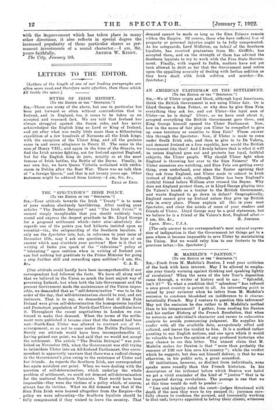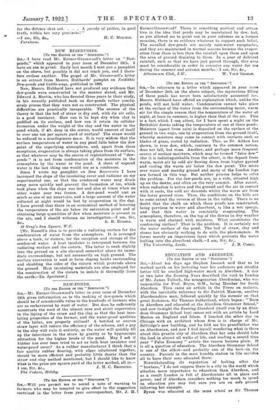M. MADELIN'S "DANTON."
(To THE EDITOR OP THE " SPECTATOR.")
Sia,—Fresh from M. Madelin's Denton, I read your criticism of the book with keen interest. May I be allowed to empha- size your timely warning against thinking and speaking lightly of revolution? When the news of the late Tsar's deposition came through, a writer of history said to me : " Splendid, isn't it?" To what a condition that " splendour " has reduced a once great country is patent to all. An interesting point is raised by your reviewer when he infers from M. Madelin's omission to condemn bloodshed an indifference to it charac- teristically French. May I venture to question this inference? May not the omission be due rather to M. Madelin's method than to his temperament? I gather, from reading his Danton and his earlier History of the French Revolution, that when he submits an individual's character and career to exhaustive analysis he avoids pronouncing judgment. He supplies his reader with all the available data, scrupulously sifted and collated, and leaves the verdict to him. It is a method rather puzzling to our English notions, and one upon which it would be valuable to have the opinion of any professed historian who may chance to see this letter. The utmost claim that M. Madelin makes for Denton is that " more than probably the summer of 1792 saw him save his country "; while the verdict which he suggests, but does not himself deliver, is that he was otherwise, in his public acts, a great scoundrel.
Of institutions, however, as distinct from individuals, none speaks more roundly than this French historian. In his description of the tribunal before which Denton was haled we get a vivid reminder of the kind of "justice " that is to be expected during revolutions. The passage is one that we at this time would do well to ponder :—
" Lies and iniquity ruled the court—judges threatened with death if the men they were to try escaped it; jurymen care- fully chosen to condemn the accused, and incessantly working to that end; lawyers appointed to betray their clients, witnesses
for the defence shut out. . . . A parody of justice, in good truth, within her very precincts! "
—I am, Sir, Jac.. H. C. Mnicnut.
Farnham.











































 Previous page
Previous page